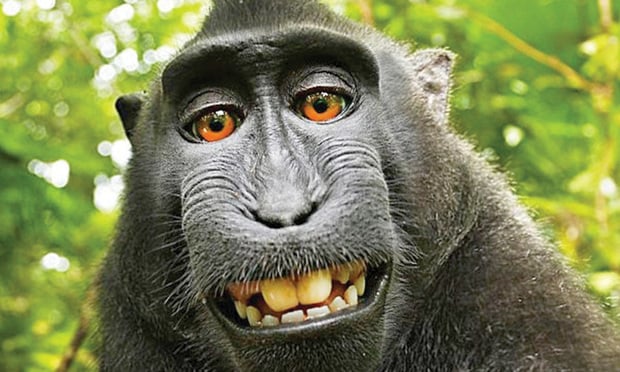Ninth Circuit to Rule in Monkey Selfie Case Despite Settlement
The court declined to dismiss the case, saying it's "wary of abetting 'strategic behavior' on the part of institutional litigants."
April 13, 2018 at 03:57 PM
4 minute read

The Ninth Circuit is heading back to the zoo.
Seven months after a nature photographer and People for the Ethical Treatment of Animals settled the famed monkey selfie copyright case, the appellate court has said not so fast. It will be issuing an opinion after all, and probably shortly.
For reasons including its wariness of “abetting 'strategic behavior' on the part of institutional litigants,” the U.S. Court of Appeals for the Ninth Circuit denied the parties' joint motion last fall to dismiss the case and vacate a lower court order from U.S. District Judge William Orrick III of the Northern District of California.
Naruto v. Slater made international headlines last year when PETA challenged photographer David Slater's copyright claim on portraits of a macaque shot in Indonesia. Though the parties dispute exactly how the photos were taken, PETA alleged that Slater had set up his camera and monkey Naruto had deliberately pressed the shutter multiple times after becoming aware of his own reflection in the lens.
PETA and a primatologist who said she'd monitored the macaques for years brought suit as Naruto's next friends, saying the monkey should hold the copyright, not Slater. Slater and book publisher Blurb argued that the Copyright Act does not contemplate awards to non-human authors.
After the primatologist dropped out on appeal, and oral arguments at the Ninth Circuit seemed to favor Slater and Blurb, the parties struck a settlement deal in which Slater reportedly agreed to donate 25 percent of future revenue from the selfies to charities that protect Naruto's habitat.
Competitive Enterprise Institute, with counsel from Theodore Frank, opposed the parties' motion to dismiss the case. Even if the Ninth Circuit chose not to rule, it should leave Orrick's district court order in favor of Slater in place, Frank argued. That would “deter PETA and other groups from using the Copyright Act as an ideological weapon to generate publicity and impose legal costs on innocent copyright holders,” Frank wrote at the time.
The Ninth Circuit never ruled, until now. It noted in an unsigned five-page order that PETA has brought multiple actions asserting that animals have standing. “As one of our colleagues once warned in a similar context, 'courts must be particularly wary of abetting 'strategic behavior' on the part of institutional litigants whose continuing interest in the development in the law may transcend their immediate interest in the outcome of a particular case,” the court stated.
Berkeley solo Andrew Dhuey said he had not yet discussed the order with his client, Slater. But, he said, “I expect the court will issue a decision on the merits very shortly.”
PETA general counsel Jeff Kerr said in an emailed statement that the joint request to dismiss following settlement was “standard practice.”
“We will await further action by the court—but meanwhile, Naruto and his macaque community in Indonesia have benefited in the monkey-selfie case,” he said. “The owner of the camera that Naruto used to take the photographs agreed to donate 25 percent of his gross proceeds from the pictures to charities working to protect monkeys from being killed for bush meat and from human encroachment.”
The Ninth Circuit panel handling the case includes Circuit Judges Carlos Bea and N. Randy Smith and U.S. District Judge Eduardo Robreno of the Eastern District of Pennsylvania, sitting by designation.
Read more:
Monkey Authors Will Have to Wait Another Day for Copyrights
Monkey See, Monkey Settle: Deal in the Works to Resolve Famous Selfie Case
This content has been archived. It is available through our partners, LexisNexis® and Bloomberg Law.
To view this content, please continue to their sites.
Not a Lexis Subscriber?
Subscribe Now
Not a Bloomberg Law Subscriber?
Subscribe Now
NOT FOR REPRINT
© 2025 ALM Global, LLC, All Rights Reserved. Request academic re-use from www.copyright.com. All other uses, submit a request to [email protected]. For more information visit Asset & Logo Licensing.
You Might Like
View All
Growth of California Firms Exceeded Expectations, Survey of Managing Partners Says
5 minute read
Google Makes Appeal to Overturn Jury Verdict Branding the Play Store as an Illegal Monopoly
5 minute read
Eight Years On, A&O Shearman’s Fuse Legal Tech Incubator Is Still Evolving
4 minute read
Chicago Law Requiring Women, Minority Ownership Stake in Casinos Is Unconstitutional, New Suit Claims
5 minute readTrending Stories
- 1Transgender Care Fight Targets More Adults as Georgia, Other States Weigh Laws
- 2Roundup Special Master's Report Recommends Lead Counsel Get $0 in Common Benefit Fees
- 3Georgia Justices Urged to Revive Malpractice Suit Against Retired Barnes & Thornburg Atty
- 4How Gibson Dunn Lawyers Helped Assemble the LA FireAid Benefit Concert in 'Extreme' Time Crunch
- 5Lawyer Wears Funny Ears When Criticizing: Still Sued for Defamation
Who Got The Work
J. Brugh Lower of Gibbons has entered an appearance for industrial equipment supplier Devco Corporation in a pending trademark infringement lawsuit. The suit, accusing the defendant of selling knock-off Graco products, was filed Dec. 18 in New Jersey District Court by Rivkin Radler on behalf of Graco Inc. and Graco Minnesota. The case, assigned to U.S. District Judge Zahid N. Quraishi, is 3:24-cv-11294, Graco Inc. et al v. Devco Corporation.
Who Got The Work
Rebecca Maller-Stein and Kent A. Yalowitz of Arnold & Porter Kaye Scholer have entered their appearances for Hanaco Venture Capital and its executives, Lior Prosor and David Frankel, in a pending securities lawsuit. The action, filed on Dec. 24 in New York Southern District Court by Zell, Aron & Co. on behalf of Goldeneye Advisors, accuses the defendants of negligently and fraudulently managing the plaintiff's $1 million investment. The case, assigned to U.S. District Judge Vernon S. Broderick, is 1:24-cv-09918, Goldeneye Advisors, LLC v. Hanaco Venture Capital, Ltd. et al.
Who Got The Work
Attorneys from A&O Shearman has stepped in as defense counsel for Toronto-Dominion Bank and other defendants in a pending securities class action. The suit, filed Dec. 11 in New York Southern District Court by Bleichmar Fonti & Auld, accuses the defendants of concealing the bank's 'pervasive' deficiencies in regards to its compliance with the Bank Secrecy Act and the quality of its anti-money laundering controls. The case, assigned to U.S. District Judge Arun Subramanian, is 1:24-cv-09445, Gonzalez v. The Toronto-Dominion Bank et al.
Who Got The Work
Crown Castle International, a Pennsylvania company providing shared communications infrastructure, has turned to Luke D. Wolf of Gordon Rees Scully Mansukhani to fend off a pending breach-of-contract lawsuit. The court action, filed Nov. 25 in Michigan Eastern District Court by Hooper Hathaway PC on behalf of The Town Residences LLC, accuses Crown Castle of failing to transfer approximately $30,000 in utility payments from T-Mobile in breach of a roof-top lease and assignment agreement. The case, assigned to U.S. District Judge Susan K. Declercq, is 2:24-cv-13131, The Town Residences LLC v. T-Mobile US, Inc. et al.
Who Got The Work
Wilfred P. Coronato and Daniel M. Schwartz of McCarter & English have stepped in as defense counsel to Electrolux Home Products Inc. in a pending product liability lawsuit. The court action, filed Nov. 26 in New York Eastern District Court by Poulos Lopiccolo PC and Nagel Rice LLP on behalf of David Stern, alleges that the defendant's refrigerators’ drawers and shelving repeatedly break and fall apart within months after purchase. The case, assigned to U.S. District Judge Joan M. Azrack, is 2:24-cv-08204, Stern v. Electrolux Home Products, Inc.
Featured Firms
Law Offices of Gary Martin Hays & Associates, P.C.
(470) 294-1674
Law Offices of Mark E. Salomone
(857) 444-6468
Smith & Hassler
(713) 739-1250






